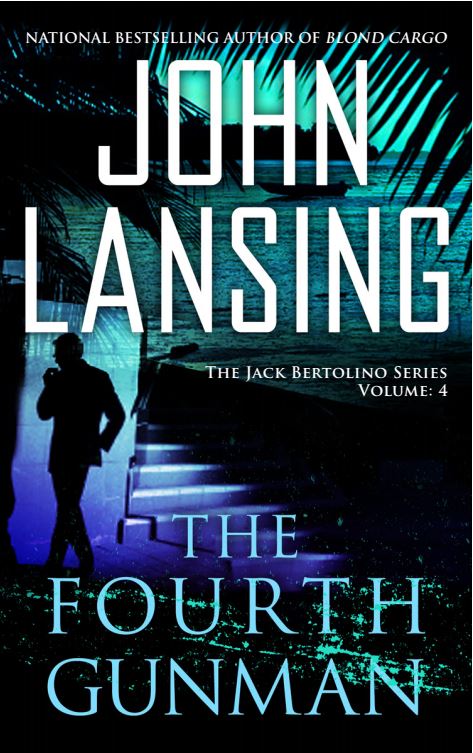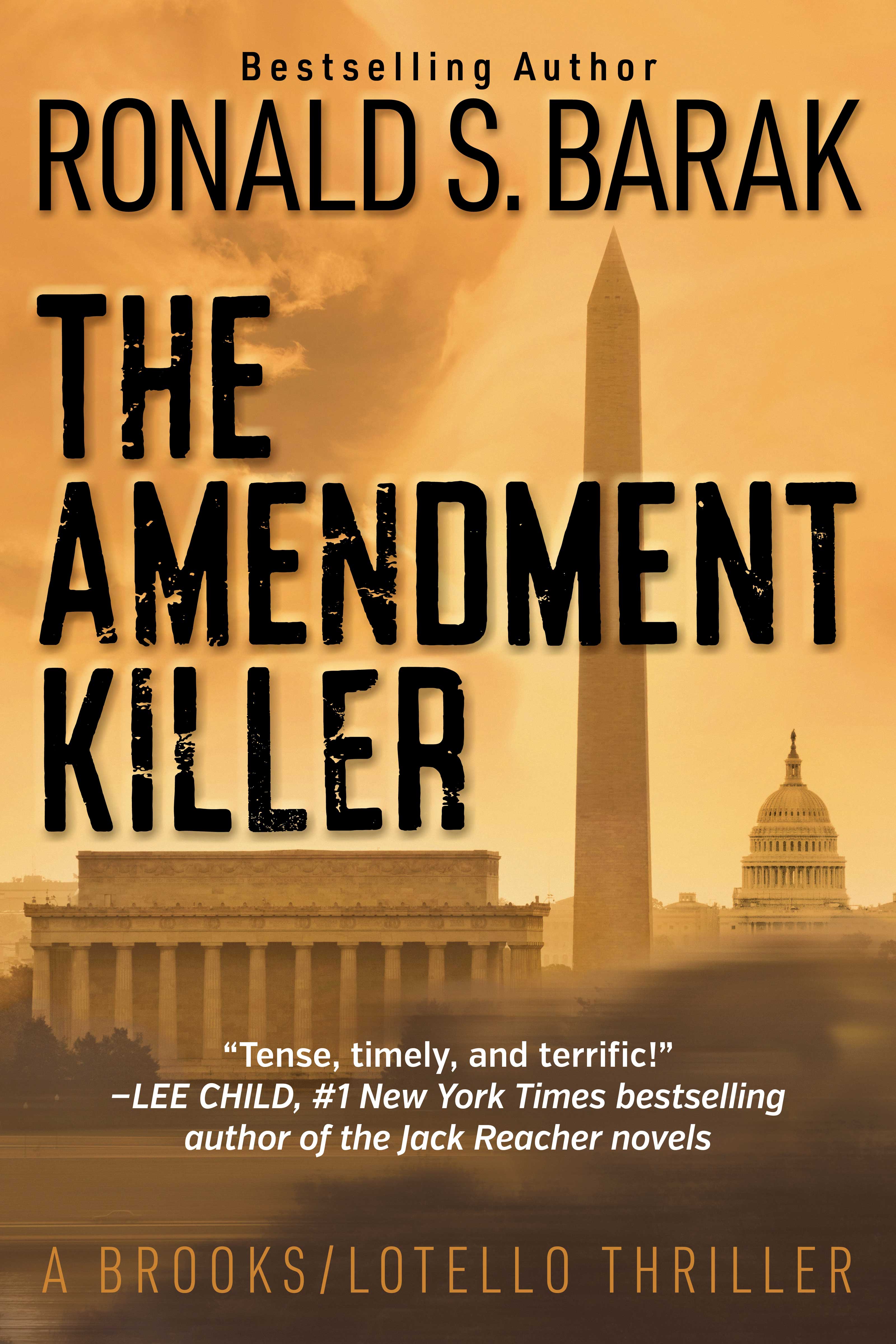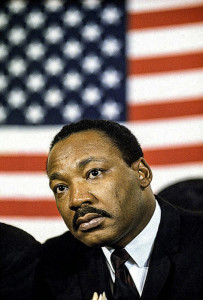The Fourth Gunman
February 20th, 2018
The Fourth Gunman
by John Lansing
on Tour February 19 – March 24, 2018
Synopsis:

From the best selling author of The Devil’s Necktie, and Blond Cargo comes the latest title in the Jack Bertolino series.
Retired inspector Jack Bertolino straddles two perilous worlds. Known for his impeccable police work, Jack has also done a priceless favor for an infamous Mafia Don: he saved the gangster’s kidnapped daughter from being sold into the sex trade, and brought her safely home.
In Jack’s line of work, he can’t help but have friends—and enemies—on both sides of the law.
So when FBI agent Luke Hunter goes missing after a deep undercover assignment with that same mob boss, the FBI calls Jack in, looking for a favor. With his connections and skills, Jack’s the only man for the job: find Luke Hunter, dead or alive.
The Mobster operates an illegal gambling yacht in international waters off of Southern California, and when Luke went missing, so did half a million dollars of the mob’s money. As Jack dives into the case, he’ll learn the true mystery isn’t the agent’s disappearance, but something far more ominous…
The Fourth Gunman is a sizzling action-packed thriller that will keep you turning pages until the explosive finale.
Book Details:
Genre: Crime/Thriller
Published by: Simon & Schuster
Publication Date: March 6, 2018
Number of Pages: 375 (estimated)
ISBN: 1501189530 (ISBN13: 9781501189531)
Series: Jack Bertolino, 4 | Each is a Stand Alone Novel
Purchase Links: Amazon, Barnes & Noble, & GoodreadsISLAND BREEZES
This book brings to mind a lot of questions. Who was the fourth gunman? Where is he? Who is he working for – the good guys, the bad guys or the really, really bad guys?
That’s the challenge for Jack Bertolino. By the way, who’s he working for?
I was getting an adrenaline rush from this book, and didn’t want to put it down. When it ended, I didn’t want it to end. This was my first John Lansing book. It won’t be my last, because I want to read more about Mr. Bertolino. I know the next book in this series won’t be out soon enough for me. I’m pretty sure Mr. Lansing and his publisher won’t be able to get it out next week.
***Book provided without charge by Partners in Crime Tours.***
Read an excerpt:
One
Luke Hunter sat hunched over a tight built-in desk in the cabin of a weathered thirty-six-foot catamaran docked in Marina del Rey. His fingers flew over the keyboard of a MacBook Pro. There had been one amber sconce illuminating the cabin before he broke in to the vessel, but now the laptop computer was throwing more light than he was comfortable with. At two a.m., all was quiet on the dock, but Luke was running late and still had another stop to make before he could call it a night.
Luke’s hair was short, brown, and unruly, his Italian eyes smoky, his beard dark and in need of a shave. His angular face was set with determination as he slipped a flash drive into the computer, tapped a few keys, and hit Copy, hoping to make short work of his theft.
The cabin was teak, and brass, and well worn. Rolled navigational charts littered the cramped workspace but didn’t intrude on the comfortable living quarters and the bunk that occupied the bow of the catamaran.
Luke spun in the chair, unraveled specific charts on the bed, snapped photos with his iPhone, and stowed the maps back where he’d found them. He had a theory as to why so many of the charts were focused on the waters in and around the Farallon Islands, off the coast of San Francisco, and hoped the computer files would corroborate his suspicions.
He took pictures of the scuba tanks, masks, flippers, speargun, and weight belts that were stowed aft. The galley was diminutive but efficient. A few potted succulents and fresh herbs on a shelf above the sink lent a feminine touch to the nautical surroundings. Nothing of interest there.
Luke heard the screech of the rusted security gate that led from the parking lot to the yachts and immediately shut down the computer, pocketed the flash drive, and closed the lid, tamping out the light.
He hoped it was just another liveaboard moored at the same dock, returning home after a night on the town. But he spun in place, laced his hands behind his head, and stretched out his legs, facing the teak steps that led from the stern into the cabin, ready to talk his way out of a dicey spot if necessary. It would be uncomfortable but doable. He set his face into a gotcha grin, ready to go on the offensive. It wouldn’t be the first time he’d been caught with his hand in the cookie jar.
The boat rocked slightly, the slippered footfalls nearly silent as a woman made her descent into the body of the vessel. Silk drawstring pants hugged her willowy frame as she stepped off the wooden stairway and seemed to suck all the air out of the cabin.
Roxy Donnelly had straight red hair that kissed her collarbone and parted in the middle, and a light feathering of freckles on her cheeks and chest. Her hazel eyes bore in to Luke’s, assessing the situation. She came to a conclusion and—without speaking—told him everything a man wanted to hear from a woman.
Roxy was backlit, her figure silhouetted in a diaphanous white blouse. Luke could see she was braless, and his heart quickened. Her nipples rippled the fabric, and sparks spread to Luke’s chest and down to his groin. As he became aroused, he found himself at a loss for words. No mafioso cracking wise, only deep breathing trying to hide his visceral reaction to the danger of her unexpected arrival. The cabin seemed to become tighter still, if that was possible, until Roxy broke the silence.
“I knew you were smarter than you looked.” If she was aware that Luke had raided her computer, she gave no indication or surprise at his presence. “You saw the schedule, Trent’s on call.”
She stepped closer and Luke found himself on his feet. “I made the schedule,” he said.
Roxy stepped so close their noses touched. He could feel her breath. The light scent of perfume was intoxicating. She reached down and touched his erection, stoking the fire. “I know what you drink, but I don’t know how you like it.”
“Any way you serve it,” Luke said, his voice deep, throaty, and bedroom. He knew he should hit the road but stood transfixed.
Roxy took his hand, squeezed it, and led him to the queen-size bunk in the rear of the cabin. “Get comfortable.”
She stepped into the galley, poured two glasses of Scotch, neat, kicked off her slipper shoes, and glided barefoot to the bed, handing Luke his drink. They clinked and each took a deep sip, never breaking eye contact.
Roxy set her glass down, slowly unbuttoned her blouse, and shrugged out of it, revealing sheer perfection. A dancer’s body. Compact upright breasts, a narrow sculpted waist, and a sapphire-pierced belly button. She tossed the blouse onto the chair Luke had been sitting in, leaned over him, and unbuckled his belt more roughly than he would have expected.
Luke might have received a reality check, but by the time his cell phone buzzed in his pants pocket, they were hanging over the chair.
“You’re not upset?” he said, a statement of fact.
“You should’ve called first, but it was inevitable. It was perfect the first time. We work too hard for no pleasure. Roll over, I’m good with my hands.”
No argument from Luke, who pulled off his gray crewneck and tossed it on the chair. He eased onto his stomach carefully because he was sporting a blazing hard-on.
Roxy was fully engaged. She lit a candle, then raked his back with her fingernails, the brief contact from her nipples as she leaned over him burning a trail from his neck down to his waist. As she straddled Luke, he felt her heat and let out a husky groan.
Roxy started on his lower back and slowly worked her way up his spine, compressing with thumbs and forefingers every third vertebrae until she reached his neck.
“You are good,” he murmured.
By the time Luke realized cold steel was pressed against the back of his head and not her thumbs, he was dead.
The explosion of the hammer striking the .22 round in her derringer created a blinding electric flash behind Luke’s eyes. The bullet rattled around his skull, tearing up brain matter, until his world turned pitch-black.
Roxy jumped off the bed, grabbed a plastic garbage bag out of the galley, pulled it over Luke’s head, and cinched it around his neck to catch any blood evidence. She picked up her cell and hit Speed Dial.
“Trent. We’ve got a situation,” and Roxy gave him the rapid-fire shorthand version while she rifled through Luke’s pants and billfold, her voice devoid of emotion. Her body vibrated uncontrollably as adrenaline coursed through her nervous system. She dropped Luke’s keys and willed her hands to stop shaking as she placed his cell phone and the flash drive next to her laptop. “I’ll clean things up on the home front, you keep your ears open and get a feel for the play at your end. Stay on shift—Shut the fuck up and let me talk!” And then in a tight whisper, “I killed a man, okay? I’ve had better nights. Okay, okay, but only text if you sense movement in our direction.” Roxy was unraveling. “You won’t hear from me again until, until, shit, Trent, until I call you.”
Roxy snapped out the light and walked over to the door and tried to still her breathing as she sucked in the thick sea air and listened for any movement on the dock. Water lapping against hulls and nylon lines clanking on aluminum masts were the only early-morning sounds. If not for the dead body lying on her bunk, it would almost be peaceful.
Roxy got down on her hands and knees and scrabbled around until she came up with the keys she’d dropped. She sat on the edge of the bed and made a mental list of what she had to accomplish. Sucked in a breath, nodded, and went into action.
Roxy pulled the duvet cover over Luke’s body and changed into jeans and black T-shirt and black running shoes. She grabbed a pair of thin cotton gloves and shrugged into Trent’s oversize black hoodie.
She rifled through the junk drawer and pulled out a roll of blue painter’s tape, took a credit card and the cash out of Luke’s wallet and added it to her own, and ran out of the catamaran, locking the door behind her.
*****
Roxy pulled the hood over her red hair and slipped on the gloves as she ran up the dock and out through the chain-link security gate.
There was a smattering of cars in the lot, and Roxy started hitting the button on the remote-entry key for Luke’s car but got no response. She knew Luke drove a black Camaro but was at a loss. She spun in place and felt like she was going to explode. She turned off the emotion, knowing that if she didn’t fly right, she was as good as dead.
She jogged over to the next lot that was half full and tried the key again. Nothing. Roxy fought to suck down the bile and panic that threatened to overwhelm her. She ran up and down three rows of cars. Still nothing. She pounded toward the apartment complex across the street.
Roxy heard the ding before she found the car.
Luke had parked in the open lot that serviced the channel on the other side of the road. Mercury-vapor security lamps provided ambient light. Roxy checked the license plate and went to work.
She pulled out the tape and ripped off a small strip, turning a 1 into a 7. She tore off two smaller strips and changed a second 1 to a 4. She repeated the task on the front plate and dove, flattening herself on the rocky macadam surface, as a car drove up the street.
A black-and-white rolled onto the lot, its tires crackling over the uneven surface. The cop car did a silent drive past her aisle, slowed, then moved up to the far end of the lot, turned left, and back out onto the street.
Time seemed to stand still, but the pounding of Roxy’s heart reminded her that the clock was ticking and daylight would be her enemy. She grabbed a handful of dirt from the ground and wiped it onto the license plate with one eye peeled for the cop car. She did the same with the rear plate, obscuring some of her handiwork. After the cop car made his final pass down the street and disappeared onto the main drag, Roxy jumped behind the wheel of the Camaro, adjusted the seat and mirror, put on a pair of dark glasses, and rumbled out of the parking lot.
*****
It took sixteen minutes to get from the marina to long-term parking at LAX. The black Camaro had black-tinted windows, and when Roxy pulled into the lot, hit the button, grabbed a ticket, and waited for the electronic arm to rise, she had her hood pulled tight, her dark sunglasses in place, and her head tilted down. If there had been a security camera at play, all it would’ve recorded was the top of a dark hoodie.
The lot was huge. Roxy motored to the far end and parked between two large SUVs that all but swallowed Luke’s low-slung muscle car. She checked the glove compartment to see if there was anything worth taking, or revealing as to Luke’s true purpose, snooping in the wrong place at the wrong time. She found the car’s registration and proof of insurance and pocketed the documents in the hope that it might slow the inquiry sure to follow. She hit the button that opened the trunk, readjusted the driver’s seat, locked the doors, and exited the vehicle.
A salmon glow pulsed above the horizon, a warm-up for the main event. The adrenaline had worn off, and Roxy was so tired she could have slept standing up. What she saw when she looked in the trunk got her heart pounding and her head spinning again. A large leather satchel on wheels, filled with cash. More cash than Roxy had ever seen in her twenty-seven years on God’s planet. It was Mafia money. The weekend’s take from the illegal gambling yacht where she bartended. She zippered the bag and slammed the trunk shut. She didn’t need any more heat than she’d already generated.
Roxy took a few steps away, spun back, opened the trunk, grabbed the satchel, and started wheeling it down the long row of cars toward the shuttle that arrived every fifteen minutes. She’d take the short ride to Tom Bradley International Terminal, where she planned on using Luke’s credit card at a McDonald’s to create a paper trail.
Inherent problems were created by taking the Mafia’s money, but leaving it would have been a major fuckup. A man on the run would never leave without the cash.
*****
Two black stretch limos roared into the parking lot at Long Beach Shoreline Marina, adjacent to the Bella Fortuna. Doors flew open, and eight men exited the vehicles, ran across the lot, and pounded up the yacht’s gangplank, disappearing into the body of the luxury craft.
A somber Tony-the-Man stood at the railing on the main deck and looked down as Vincent Cardona stepped out of the lead car and walked slowly up the gangplank. The two men locked eyes for what seemed to Tony like an eternity before Cardona boarded the ship.
Heads would roll, and Tony instinctively rubbed his neck— his was at the top of the list.
*****
The yellow cab let Roxy off at the Admiralty Club in Marina del Rey. She paid the driver with cash and waited until he was gone before walking next door to the Killer Shrimp Diner, where she was a regular and knew the kitchen was open twenty-four/seven. She peeled off her sunglasses, pulled the hood back, and shook out her startling red hair.
Roxy forced herself to eat scrambled eggs, bacon, and buttered toast, generating an alibi with her own credit card receipt. She paid up and rolled the satchel, laden with cash, down the sidewalk and the half-mile trek to her catamaran as the sun breached the Santa Monica Mountains behind her.
Two
Twenty-four hours had passed since the death of Luke Hunter, and the weather had turned nasty. The sea was whitecapped, the crescent moon blanketed by a thick marine layer. A perfect night for what Roxy and Trent had to accomplish.
A perfect night to dump a body.
Trent was piloting the catamaran, heading south toward the San Pedro Channel and powered by the auxiliary engine. He knew the depth of the basin was good for at least 2,250 feet. He’d studied the charts, set the GPS, and they were just a few minutes from their destination.
Trent looked right at home, almost regal, standing behind the wheel of the craft that bucked, rolled, and cut through the waves, never veering off course. He was a Saudi national and a U.S. citizen, raised in the States from the age of eight, so he had no discernible accent. He was twenty-eight years old, with a boyish open face, a buffed physique, a swarthy complexion, buzz-cut brown hair, and gray eyes that could set Roxy’s heart thrumming. A finely inked tiger ran the length of one muscled forearm, the tattooed claws drawing red blood.
Roxy stepped out of the cabin and carefully made her way behind him, wrapped her arms around his six-pack, and leaned her cheek against his back, trying to still the beating of her heart.
Trent gave her hand a firm squeeze before grabbing the wheel with both hands. “You’re a brave woman, Roxy,” he shouted over his shoulder, fighting the howling wind. “A warrior.”
The moment he announced they were approaching their destination, the GPS system gave off a shrill cry. The night was black; there were no other boats in the area, no container ships navigating the channel. It was time to get to work. He shut off the engine, locked the wheel, and lowered himself into the cabin, followed by Roxy.
Luke, head still covered with the plastic garbage bag, was dressed in nothing but his briefs. He’d been rolled onto the cabin floor; his body lay on top of the duvet cover.
Trent grabbed two fifty-pound diving belts from their scuba gear and carried them up to the main deck. Roxy handed a twenty-five-pounder through the hatch. Trent ran back down, wrapped Luke’s body tightly in the blanket, and, with Roxy’s help, dragged his deadweight up the stairs and onto the aft deck behind the wheelhouse.
Trent pulled back the duvet and fastened one belt, cinched it tight around Luke’s waist, and then made short work of the second. He grabbed the twenty-five-pound belt, wrapped it twice around Luke’s neck, and secured it. Postmortem lividity had turned Luke’s back, buttocks, and legs a blackish-purple where the blood had settled.
Trent pulled the duvet taut, rolling Luke’s body over, and ripped a cut from top to bottom on the garbage bag so it would disengage after splashdown and be dragged out to sea. He worried it might fill with air as the corpse decomposed, and drag the body to the surface.
Roxy steeled herself as she looked down at Luke. His face was bone-white, his eyes devoid of color, just a thick opaque film. If there was one life lesson she had learned from her father, it was to meet trouble head-on. Never roll over, never look back, and never run. She swallowed her rising bile and choked, “Do it.”
Trent grabbed both ends of the blanket and muscled Luke’s body with 125 pounds of lead weights off the stern of the catamaran, tossing the duvet into the chop behind him.
Roxy and Trent stood shoulder to shoulder as they watched Luke float for a second and then slip below the water’s surface; they were confident he was permanently buried at sea and they could move forward with their plan.
Three
Day One
Retired Inspector Jack Bertolino was sitting in the nosebleed seats at Klein Field at Sunken Diamond, Stanford University’s baseball stadium, in Northern California. The sun was blinding, the sky ultra-blue, the wisp of cirrus clouds as white as cotton. The old-growth pepper trees surrounding the field swayed in the light breeze carrying the scent of eucalyptus and fresh-mowed grass, taking some of the heat off the early-September afternoon.
Jack had his eyes closed behind his Ray-Bans, taking in the sounds of the college baseball game, now in the eighth inning, being played in the stadium below. His hair was dark brown verging on black, with strands of silver feathering the temples, and worn long enough to threaten his collar. His angular face was weathered from years doing undercover narcotics work on the streets of NYC, and his tan only served to accentuate the scars from hard-fought battles. A bump on his otherwise straight Roman nose, a gift from a crack dealer, buffered some of Jack’s innate intensity. At six-two and big-boned, Jack had a tight fit in the stadium seating, but the sound of the hard ball slamming into leather, the crack of the bat, the umpire’s barked calls, and the emotion of the crowd made it a perfect day. Took him back to his youth playing the game on Staten Island, where he had raised his son, Chris.
There was a chance Chris was going to pitch for the first time since the attempt on his life that had shattered his throwing arm nine months earlier. Jack wouldn’t have missed seeing his son in action again for the world. It hadn’t been an easy recovery for the young man, physically or mentally, and Jack tried to keep his own emotions in check. He didn’t want his heavy feelings to pull Chris down.
Jack was jolted out of his reverie as a trim man wearing a light-weight gray suit and dark aviator sunglasses, with zero body fat and white brush-cut hair, banged against his knees as he moved down the aisle, finally dropping into the seat directly to Jack’s right.
An attractive, serious woman wearing an equally professional gray pantsuit, with a jacket cut large enough to accommodate her shoulder rig and 9mm, made her way up his aisle. There was something about a woman and a gun that was a turn-on for Jack. Or maybe it was her shoulder-length auburn hair that shone as bright as her mirrored sunglasses. She head-tossed her hair off her face as she took the seat to Jack’s left, feigning interest in the game.
Jack wasn’t surprised by the untimely visit; he had made the feds on his flight from LAX and been waiting for them to play their hand.
“To what do I deserve the honor?” he said, his eyes lasered on the game as the Ohio State Buckeyes headed for the bench and the Stanford Cardinals ran onto the field. Chris had been in the bullpen warming up for the past twenty minutes but remained sidelined; the game was tied three to three at the top of the ninth, and it seemed unlikely he’d be called to play.
“I couldn’t do it,” the female FBI agent said, her eyes never leaving the field. Jack didn’t respond, so she continued, “Come to the game if it were my kid. Too much pressure.” Her voice carried an easy strength, and she wasn’t going to be deterred by his silence. “Especially with all your boy has been through,” letting Jack know he had no secrets from the FBI.
Ohio pounded a ball toward the left-field fence. The batter shot by first and was held up on second by the third-base coach.
It never surprised Jack how much the government knew about civilians’ lives, but his son was sacrosanct. And he knew if he spoke right away, he might not be able to control his growing anger at the personal violation.
The male agent, picking up on Jack’s energy, took off his glasses and proffered his hand. “Special Agent Ted Flannery.” He looked to be pushing fifty but had the body and vigor of a thirty-year-old. “Sorry for the intrusion, Jack, but we’ve come to ask for your help.” Flannery’s hand hung in midair until it became clear Jack wasn’t going to respond. Undaunted, the agent went on, “You’ve had a good relationship with the FBI throughout your career, Jack, and beyond. It’s been duly noted and appreciated, and because of your recent history, you’re in a unique position to be of service.”
“What do you need?” Jack asked, giving away nothing.
“Vincent Cardona,” the female agent said, answering his question. “You visited his home in Beverly Hills on the seventh of May. You were on Cardona’s payroll, hired to find his daughter, Angelica Marie, who’d been kidnapped. An altercation occurred. You slammed Cardona up against the wall, Peter Maniacci drew down on you, and Cardona’s cousin Frankie, with two other gunmen on his heels, ran out of the kitchen, ready to shoot you dead if ordered.”
“You wired the house?” Jack asked.
“Cardona’s too smart for that. He does a sweep once a week. No . . .” She paused for effect. “The fourth gunman was an FBI agent.”
The level of intensity in her tone wasn’t lost on Jack. She had referred to her agent in the past tense, but there was something more. Something unspoken, Jack thought.
Ohio thundered a ball over the fence for a two-run homer. Jack’s body tensed as the coach walked onto the field, huddled with the pitcher and catcher, and signaled toward the sidelines.
Chris Bertolino, number 11, ran out onto the mound and tossed a few back and forth with the catcher as the field was cleared and the game resumed. At six-two, Chris was as tall as Jack, but lean and rangy with sandy brown hair, a gift from his mother’s side of the family.
Jack raised his hand to his lips, and the feds let him concentrate on the game. They knew Bertolino wasn’t a man who could be pressured, and understood the personal significance of this moment.
Chris sucked in a deep breath, nodded to the catcher, and unloaded. His first pitch flew high on the outside. Ball one.
His second pitch went wide. Ball two.
The third pitch was hit. A sizzling line drive caught by the shortstop. First out.
The catcher walked out to the mound, whispered a few words to Chris, and resumed his position behind home plate.
Chris nodded, his game face on. If nerves were at play, he showed nothing to his opponent. He wound up and fired a fast-ball. Strike one. He denied the first two signals from the catcher and threw a second blistering pitch. Strike two. The crowd in the stands started to get loud. Chris tossed a slider, wide. The batter reached, fanned for the ball, and came up empty. Strike three.
The stadium erupted as the second batter stepped into the dugout and tossed his helmet in disgust.
The crowd started chanting and Jack’s stomach tightened. The lanky Buckeye leadoff batter made a big show of whipping his bat to loosen up before flashing a dead eye toward Chris, hocking a loogie onto the red clay, and stepping up to the plate.
Chris smoked a fastball.
The batter swung and made contact. The ball took a short hop and was plucked up by the second baseman, who threw Ohio out at first.
The crowd leaped to its feet as Chris led the team off the field, having stopped the flow of blood.
Jack let out a long, even breath, trying to slow his beating heart.
Chris never made it to bat. The first three Stanford starters were struck out in succession.
Stanford lost the game five to three, but it was a personal triumph for Chris, and Jack wished he were alone to savor the moment.
“I’ve got to get down to my boy,” he said to the female agent, who seemed to be in charge.
“Our agent disappeared three weeks ago,” she said, clearly un-willing to relinquish the moment. “He was deep undercover, and we believe he was on to something major. He never checked in, never filed a final report.”
“You should call in the cops.”
“We won’t jeopardize the case we’ve built against Vincent Cardona.”
“I’ve been down that rabbit hole,” Jack said, ending their impromptu meeting. “Don’t want anything to do with the man.” He stepped past the woman.
“Jack,” she said. The undercurrent in her voice, a sadness, struck a chord and turned him in place. She reached out with her card and looked up to lock eyes with him. “Liz Hunter. Think about it, Jack, and call me. Any time.” And then, “We could use your help.”
Agent Hunter wore light makeup on her clear tanned skin. She couldn’t have been over thirty, but her wide forehead was etched with fine worry lines. The hazards of the job, Jack decided. Her cheekbones were high and strong, her figure athletic, her slender, elegant neck tilted slightly to make her point. Jack found himself wondering what her eyes looked like.
“Why should I get involved?”
“The missing agent is my brother.”
Jack nodded, took the card, turned, and made his way down the steep concrete steps toward the Cardinals locker room.
***
Excerpt from The Fourth Gunman by John Lansing. Copyright © 2017 by John Lansing. Reproduced with permission from John Lansing. All rights reserved.
Author Bio:

Best-selling author John Lansing started his career as an actor in New York City. He spent a year at the Royale Theatre performing the lead in the Broadway production of “Grease” before putting together a rock ‘n’ roll band and playing the iconic club CBGB.
Lansing closed up his Tribeca loft and headed for the West Coast where he landed a co-starring role in George Lucas’ “More American Graffiti,” and guest-starred on numerous television shows.
During his fifteen-year writing career, Lansing wrote and produced “Walker Texas Ranger,” co-wrote two CBS Movies of the Week, and co-executive produced the ABC series “Scoundrels.”
John’s first book was Good Cop Bad Money, a true crime tome he co-wrote with former NYPD Inspector Glen Morisano.
The Devil’s Necktie, his first Jack Bertolino novel, became a best seller on Barnes & Noble and hit #1 in Amazon’s Kindle store in the Crime Fiction genre.
Jack Bertolino returns in John’s fourth novel, “The Fourth Gunman.”
A native of Long Island, John now resides in Los Angeles.
Catch Up With John On www.johnlansing.net, Goodreads, Twitter, & Facebook!
Tour Participants:
Visit the other great hosts on this tour for more great reviews, interviews, guest posts, and giveaways!
Giveaway:
This is a rafflecopter giveaway hosted by Partners in Crime Virtual Book Tours for John Lansing. There will be 1 winner of one (1) Amazon.com gift Card. The giveaway begins on February 19 and ends on March 25, 2018.











